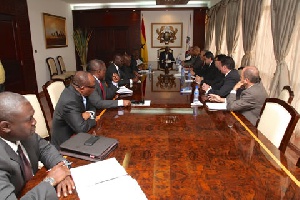An Economic Analyst with Databank has expressed optimism that an anticipated programme from the International Monetary Fund (IMF) will help cushion the Ghana Cedi against fluctuations on the currency market.
Courage Martey told Starr Business that the implementation of the three-year IMF programme which is still being negotiated between the Bretton Wood Institution and the Government of Ghana will help stabilise the Cedi against the major international currencies of trade such as the Dollar.
Last year the Cedi was reported by Bloomberg as the world’s worst-performing currency.
Its value consistently fell by about 40 percent by the third quarter of the 2014.
The trend caused the Government to roll out some forex control measures to rein in the fall and infuse confidence in the economy.
By the fourth quarter of 2014, an infusion of $2.7 billion into the economy through a $1-billion Eurobond flotation and $1.7-billion cocas syndicated loan facility helped the Cedi to gain some ground and stability against the Dollar and Euro.
Some Economists including Kwamena Essilfie Adjaye of the Ghana Growth and Development Platform (GGDP), a group of economic analysts, late last year expressed fears the stability of the Cedi cannot be sustained.
It said the contributing factors to the Cedi’s stability will be short-lived “as there will not always be a Eurobond; and as the Cocobod syndicated foreign loan happens only once a year, in late August to early September.”
“Towards the end of every year, there is a seasonal increase in the demand for Dollars and other foreign currencies for purchasing goods and services for the end of year festivities”.
It nonetheless mentioned that: “The prospect of an IMF facility after government announced its intention to go for a facility in August 2014,” was one of the contributing factors to the Cedi’s stability and further suggested that “certain steps must be taken urgently to ensure sustainable increase in the supply of foreign exchange that will contribute to long-term strength of the Cedi”.
Databank’s Martey believes once the IMF programme is rolled out, the Government would be compelled to implement significant austerity measures to rein in the high fiscal deficit which could have a domino effect on the Cedi’s stability.
Business News of Thursday, 15 January 2015
Source: starrfmonline.com













